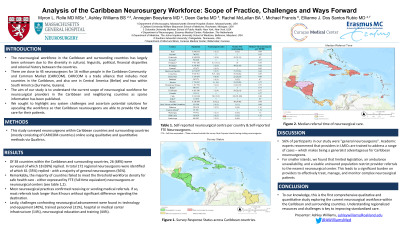Analysis of the Caribbean Neurosurgery Workforce: Scope of Practice, Challenges and Ways Forward
Friday, April 21, 2023


Ashley Williams, BS (she/her/hers)
Medical Student
Oakland University William Beaumont School of Medicine
Royal Oak, Michigan, United States
ePoster Presenter(s)
Introduction: There are close to 45 neurosurgeons for 16 million people in the Caribbean Community (CARICOM) region. The aim of our study is to understand the current scope of practice for neurosurgical providers in the Caribbean, as very sparse information has been published. We sought to highlight any system challenges and ascertain potential solutions for upscaling the workforce so that Caribbean neurosurgeons can provide the best care for their patients.
Methods: This study surveyed neurosurgeons within Caribbean and CARICOM countries online using qualitative and quantitative methods via Qualtrics.
Results: Of 38 countries within the Caribbean, 26 (68%) were surveyed of which 18 (69%) replied. In total 61 neurosurgeons were identified, with a majority of general neurosurgeons (56%). Remarkably, the majority of countries failed to meet the threshold workforce density for safe health care - either expressed by FTE neurosurgeons or neurosurgical centers (see table 1,2). Most neurosurgical practices denied receiving or sending medical referrals. If otherwise, most referrals took longer than 8 hours without significant difference regarding the destination. Lastly, challenges confronting neurosurgical advancement were found in: technology and equipment (40%), trained personnel (31%), hospital or medical center infrastructure (14%), neurosurgical education and training (44%).
Conclusion : To our knowledge, this is the first comprehensive qualitative and quantitative study exploring the current status of the Caribbean neurosurgery workforce, the challenges and the potential ways forward. Arming the local providers with improved resources and support would only serve to add value to the region thus making excellent patient care the standard for a region in need of just that.
Methods: This study surveyed neurosurgeons within Caribbean and CARICOM countries online using qualitative and quantitative methods via Qualtrics.
Results: Of 38 countries within the Caribbean, 26 (68%) were surveyed of which 18 (69%) replied. In total 61 neurosurgeons were identified, with a majority of general neurosurgeons (56%). Remarkably, the majority of countries failed to meet the threshold workforce density for safe health care - either expressed by FTE neurosurgeons or neurosurgical centers (see table 1,2). Most neurosurgical practices denied receiving or sending medical referrals. If otherwise, most referrals took longer than 8 hours without significant difference regarding the destination. Lastly, challenges confronting neurosurgical advancement were found in: technology and equipment (40%), trained personnel (31%), hospital or medical center infrastructure (14%), neurosurgical education and training (44%).
Conclusion : To our knowledge, this is the first comprehensive qualitative and quantitative study exploring the current status of the Caribbean neurosurgery workforce, the challenges and the potential ways forward. Arming the local providers with improved resources and support would only serve to add value to the region thus making excellent patient care the standard for a region in need of just that.
